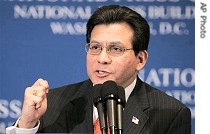-
(单词翻译:双击或拖选)
Washington
15 May 2007
The White House says President Bush still has confidence in Attorney General Alberto Gonzales, despite controversy1 over his handling of the firing of federal prosecutors2 and of the reauthorization of a clandestine3 surveillance program. New details emerged Tuesday about Gonzales' role in recertifying the wiretap program over Justice Department objections when he was White House counsel. VOA's Deborah Tate reports.
 |
| Alberto Gonzales |
Comey said he had refused to recertify the clandestine program because then-Attorney General John Ashcroft had questioned its legality just before falling ill with pancreatitis in March 2004.
Comey, who was acting4 attorney general during Ashcroft's illness, said Gonzales and former White House Chief of Staff Andy Card responded by trying to pressure Ashcroft to sign the recertification from his hospital bed. "I was very upset, I was angry. I thought I had just witnessed an effort to take advantage of a very sick man who did not have the powers of the attorney general because they had been transferred to me," he said.
But Comey said Ashcroft refused to sign the document and noted5 that Comey was the acting attorney general.
A day later, the wiretap program was reauthorized without the Justice Department's approval.
Although previously6 reported, it was Comey's first public testimony7 about the incident.
At the White House, spokesman Tony Snow declined to comment on the testimony. Instead, he praised the wiretap program and said it had come under rigorous review.
"The terrorist surveillance program was something that was always reviewed by the Department of Justice, either 45 or 90 day periods, and furthermore, was reviewed by the inspectors8 general at the Department of Justice and the National Security Agency. In addition, there was a review by the FISA [Foreign Intelligence Surveillance Act] court. The terrorist surveillance program saved lives, period," he said.
The wiretap program was set up after the September 11, 2001 terrorist attacks on the United States, and allowed the National Security Agency to monitor, without court warrants, phone calls and e-mails between suspected terrorists overseas and people in the United States.
In addition to testifying about Gonzales' role in recertifying the surveillance program, Comey also testified about the firings of U.S. attorneys. He praised many of the eight attorneys who were dismissed in a controversy that has led to bipartisan calls for Attorney General Gonzales' resignation.
The Senate panel is investigating whether the attorneys were dismissed to influence the prosecution9 of corruption10 cases with the aim of helping11 Republicans - as some Democratic critics have alleged13. Gonzales and other Bush administration officials say the dismissals were justified14, if mishandled.
On Monday, the current deputy attorney general, Paul McNulty, became the highest-ranking Justice Department official to announce he would resign since the controversy erupted in January.
At a speech at the National Press Club Tuesday, Gonzales said McNulty was ultimately responsible for recommending the attorney firings. "At the end of the day, the recommendations reflected the views of the deputy attorney general, who signed off on the names," he said.
Senator Charles Schumer, a New York Democrat12, said Gonzales, who testified before the committee last month, is trying to shift blame for the controversy. "Mr. Gonzales said in this hearing room that he accepts responsibility for the firings. Well, he should live up to his words and not point a finger today at Mr. McNulty," he said.
The top Republican on the committee, Senator Arlen Specter of Pennsylvania, was even tougher. "I think the resignation of Mr. McNulty is another significant step in evidence that the department really cannot function with the continued leadership or lack of leadership of Attorney General Gonzales," he said.
Gonzales reiterated15 that whether he remains16 as attorney general is up to President Bush.
White House spokesman Tony Snow says the president continues to have confidence in his attorney general.
 收听单词发音
收听单词发音
1
controversy

|
|
| n.争论,辩论,争吵 | |
参考例句: |
|
|
|
2
prosecutors

|
|
| 检举人( prosecutor的名词复数 ); 告发人; 起诉人; 公诉人 | |
参考例句: |
|
|
|
3
clandestine

|
|
| adj.秘密的,暗中从事的 | |
参考例句: |
|
|
|
4
acting

|
|
| n.演戏,行为,假装;adj.代理的,临时的,演出用的 | |
参考例句: |
|
|
|
5
noted

|
|
| adj.著名的,知名的 | |
参考例句: |
|
|
|
6
previously

|
|
| adv.以前,先前(地) | |
参考例句: |
|
|
|
7
testimony

|
|
| n.证词;见证,证明 | |
参考例句: |
|
|
|
8
inspectors

|
|
| n.检查员( inspector的名词复数 );(英国公共汽车或火车上的)查票员;(警察)巡官;检阅官 | |
参考例句: |
|
|
|
9
prosecution

|
|
| n.起诉,告发,检举,执行,经营 | |
参考例句: |
|
|
|
10
corruption

|
|
| n.腐败,堕落,贪污 | |
参考例句: |
|
|
|
11
helping

|
|
| n.食物的一份&adj.帮助人的,辅助的 | |
参考例句: |
|
|
|
12
democrat

|
|
| n.民主主义者,民主人士;民主党党员 | |
参考例句: |
|
|
|
13
alleged

|
|
| a.被指控的,嫌疑的 | |
参考例句: |
|
|
|
14
justified

|
|
| a.正当的,有理的 | |
参考例句: |
|
|
|
15
reiterated

|
|
| 反复地说,重申( reiterate的过去式和过去分词 ) | |
参考例句: |
|
|
|
16
remains

|
|
| n.剩余物,残留物;遗体,遗迹 | |
参考例句: |
|
|
|















